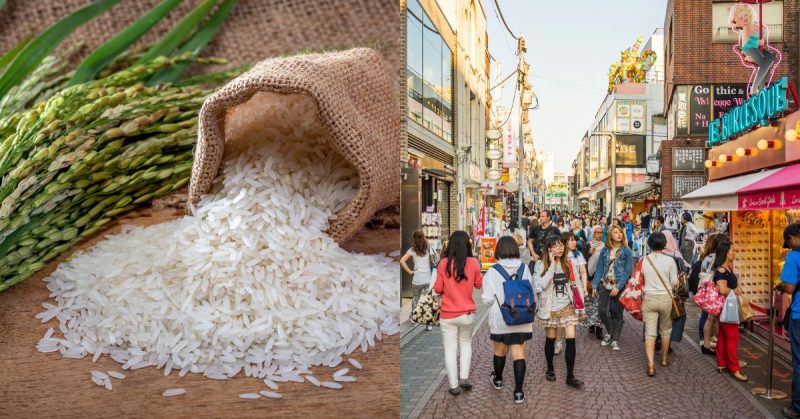Japan’s rice stock has dropped to its lowest level this century. A record influx of foreign tourists has driven up demand for rice-based dishes like sushi and onigiri. Officials reported that the rise in visitors is a key factor behind the current shortage.
Drop In Rice Stocks In Japan

Last month, rice held in the private sector fell to 1.56 million tonnes. This is the lowest amount since data collection began in 1999. It marks a 20.8 per cent drop from the previous year. The farm ministry attributed this decline mainly to poor harvests. Last year’s production was hit hard by high temperatures and water shortages.
In a statement to Hindustan Times, Hiroshi Itakura, a farm ministry official, explained that high temperatures and water shortages had led to lower rice production the previous year. He also mentioned that rice prices had not risen as much as those of other crops, such as wheat. Itakura acknowledged that although foreign tourism had increased rice consumption, Japan was not facing an immediate rice shortage.
Japan’s Cherry Blossoms, Geishas, And Mount Fuji

Japan welcomed 17.78 million tourists in the first half of 2024. This number is one million more than before the pandemic. Tourists are drawn to Japan’s cherry blossoms, geishas, and Mount Fuji. Additionally, a weaker yen has made Japan more affordable for visitors, increasing their spending on everything from souvenirs to meals.
The impact on rice demand has been significant. In the year leading up to June 30, demand for rice increased to 7.02 million tonnes. This is the first rise in a decade. While Japanese consumption of rice has been declining due to changing eating habits, the demand from foreign tourists has surged. Demand from tourists rose by 31,000 tonnes, reaching 51,000 tonnes.
Japan also faced extreme weather conditions last year. September was the hottest on record for 125 years. This year, heatwaves have resulted in 36 deaths since April, according to the disaster management agency.
Also Read: Japan Supermarket Chain Uses AI To Assess Staff Smiles; Raises Workplace Harassment Concerns
In summary, Japan’s record-low rice stockpile reflects a complex interplay of factors. Increased tourist demand, lower domestic production, and high temperatures have all contributed to the current situation. While there is no immediate threat of a rice shortage, the sharp decline in stockpile levels highlights ongoing challenges for Japan’s rice industry.
Cover Image Courtesy: Canva (Representative Image)
For more such snackable content, interesting discoveries and the latest updates on food, travel and experiences in your city, download the Curly Tales App. Download HERE. First Published: August 02, 2024 1:34 PM




